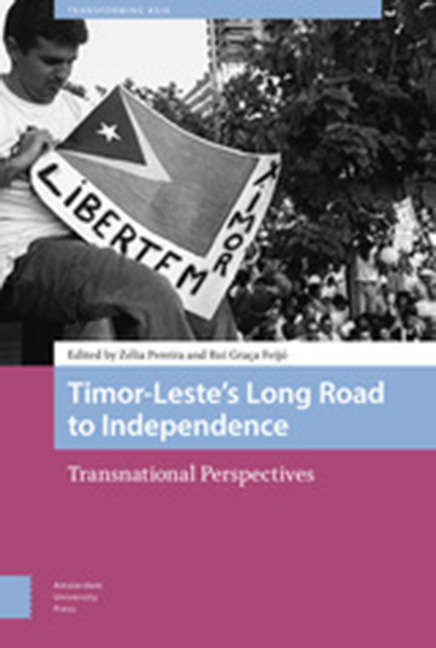Book contents
- Frontmatter
- Contents
- Acknowledgements
- A Note on the Name of the Country
- List of Figures
- Introduction: Timor-Leste’s Long Road to Independence: Outline for an Analytical Framework
- Part One Before The Portuguese Decolonisation
- Part Two The Portuguese Revolution Arrives In Timor-Leste
- Part Three Reaction To The Indonesian Invasion Of Timor-Leste
- Part Four Resisting The Indonesian Annexation Of Timor-Leste
- Index
6 - Canções Revolucionárias: Rhetoric Hermeneutic and Ideology Critique
Published online by Cambridge University Press: 14 February 2024
- Frontmatter
- Contents
- Acknowledgements
- A Note on the Name of the Country
- List of Figures
- Introduction: Timor-Leste’s Long Road to Independence: Outline for an Analytical Framework
- Part One Before The Portuguese Decolonisation
- Part Two The Portuguese Revolution Arrives In Timor-Leste
- Part Three Reaction To The Indonesian Invasion Of Timor-Leste
- Part Four Resisting The Indonesian Annexation Of Timor-Leste
- Index
Summary
Abstract
Abílio Araújo, Borja da Costa, José Alexandre Gusmão, José Ramos-Horta, Nicolau Lobato and Xavier do Amaral were fighters for independence of Timor-Leste. They were also the defenders of Timorese dignity for freedom whose lives and work explored the philosophy of “ukun rasik’an.” From rhetoric, hermeneutic and ideology critique this paper examines the cultural resistance to craft “ukun rasik’an” as a spiritual and intellectual revolution, as heirs of the philosophy of liberty and philosophy of liberation. Drawing on poems published by Borja da Costa in Cançoes Revolucionárias (Revolutionary Songs) and articles written by Nicolau Lobato, this chapter explains their opposition to colonialism and their commitment to freedom. These individuals took up the pen and the printing press (Nakroma and Timor-Leste: Jornal Povo Mau Bere) and sought to defeat the colonialists, the occupiers and collaborationists on the battlefield of ideas. The basic thesis of this chapter is to write an insight of “native intellectual resistance” in Timor-Leste.
Keywords: Revolution, Borja da Costa, hermeneutics, metaphysical revolt, cultural or intellectual resistance
A Laudatio for Francisco Borja da Costa (1946–1975)
The grand narrative constructed around the process of decolonisation from 1974 to 1975 was that “the vast majority of society of Timor-Leste are analphabets” (Pires 1981: 16; Pires 1991) and that, certainly “the people were not well prepared for independence” (Cruzeiro 2014: 233). Portugal was convinced that the Timorese's “capacity of doing revolution [to gain their independence] could not of course be great” (Pires 2013: 23). Again, the dominant idea in Portugal concerning decolonisation suggested that “the solution for ultramarine problem is political and not military” (Tíscar Santiago 2012: 378).
Since the independence of Timor-Leste, which was internationally recognised on May 20, 2002, there have been numerous articles and publications dealing with its socio-cultural, political and military resistance. However, researchers and writers have rarely dealt with intellectual resistance in Timor-Leste. A poet like Francisco Borja da Costa (1946–1975) is best known as our sumo poeta, and yet his poems are not often discussed or taught in the context of literary critique or philosophical interpretation. My purpose in this chapter is to interpret his poems in Canções Revolucionárias (Revolutionary Songs) as propaedeutic to understand the intellectual resistance at that time. Additionally, from 1972 to 1974, Borja da Costa worked at the Lisbon newspaper Diário de Notícias as a trainee journalist.
- Type
- Chapter
- Information
- Timor-Leste's Long Road to IndependenceTransnational Perspectives, pp. 193 - 216Publisher: Amsterdam University PressPrint publication year: 2023

